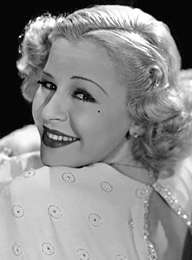Lyda Roberti
| Lyda Roberti | |
|---|---|
 | |
| Born |
May 20, 1906 Warsaw, Russian Empire (present-day Warsaw, Poland) |
| Died |
March 12, 1938 (aged 31) Glendale, California, U.S. |
| Occupation | Actress, singer |
Lyda Roberti (May 20, 1906 – March 12, 1938) was a Russian-born American stage and film actress, and singer.
Life and career
Born in Warsaw, then part of Imperial Russia, Lyda Roberti was the daughter of a German father and a Polish mother. Her father was a professional clown. As a child she performed in the circus as a trapeze artist, and was a vaudeville singer. As her family toured Europe and Asia, Roberti's mother left her husband, and in order to escape the upheaval in Russia after the Communist revolution, they settled in Shanghai, China where the younger Roberti earned money singing. They moved to the United States in the late 1920s, and Roberti began singing in nightclubs. One of Lyda's siblings was actress Manya Roberti, who later disappeared from show business.[1] Manya, whose dates of birth and death are unknown, married Russell (or Russel) Deibert and had a daughter, Lorraine.
She made her Broadway debut in You Said It in 1931, and with its success became an overnight sensation. During her run with the show, she was nicknamed "Broadway's preferred Polish blonde". Historian Edward Jablonski found that "much of her appeal to the audiences at the time was due to her Polish accent" and cited instances where her pronunciation of certain consonants would "stir audiences to gales of laughter."[2] She also appeared in the short-lived Gershwin musical Pardon My English in 1933. She moved to Hollywood and during the 1930s played in a string of films. Her sexy but playful characterisations, along with the unusual accent she had acquired during her years in Europe and Asia, made her popular with audiences.
She starred in Edward F. Cline's movie Million Dollar Legs (1932) as "Mata Machree, The Woman No Man Can Resist", a Mata Hari-based spy character who is hired to undermine the President of Klopstokia (played by W. C. Fields) in his efforts to secure money for his destitute country. Her plan is to seduce the athletes that Klopstokia is sending to the Olympic Games, and thereby prevent them from medaling. Highlights of the film include Mata Machree's steamy rendition of "When I Get Hot in Klopstokia", and the dance she performs to inspire Fields's opponent in the weightlifting competition. In Roberta, Ginger Rogers played the role that Roberti had originated on Broadway, with reviewers commenting that Rogers' performance was a completely accurate imitation of Roberti's idiosyncratic speech and mannerisms. Roberti replaced Thelma Todd in a couple of films after the death of Todd, but her health was failing due to heart disease. She began to work less frequently although two days before her death she performed a radio show with Al Jolson.
Death
According to her friend and co-star Patsy Kelly, Roberti died suddenly at age 31 from a heart attack while bending to tie her shoelace.[3] At the time of her death, she was married to broadcaster Bud Ernest. She is interred in the Forest Lawn Memorial Park Cemetery in Glendale, California.
Recordings
She found success as a comedian, and was also popular as a singer on radio. Roberti made very few recordings:
- Sweet And Hot (TCL-1461) 3-10-31 - (Brunswick private unissued recording)
- Ha Ha Ho! (TCL-1462) 3-10-31 - (Brunswick private unissued recording)
- My Cousin In Milwaukee 1/26/33 (radio broadcast)
- Take A Number From One To Ten (LA-227) 10-5-34 (Columbia 2967-D)
- College Rhythm (LA-228) 10-5-34 (Columbia 2967-D)
There is an unissued test by Eddy Duchin & his Central Park Casino Orchestra of "My Cousin In Milwaukee" attributed to Roberti, but collectors now believe that the vocal was done by Gertrude Neisen, doing her impersonation of Roberti:
- My Cousin In Milwaukee (B-12897-B) 1-18-33 (Brunswick unissued, issued on an Epic 2-LP set in the 1970s, credited to Roberti)
Filmography
- Dancers in the Dark (1932)
- Million Dollar Legs (1932)
- The Kid from Spain (1932)
- Three-Cornered Moon (1933)
- Torch Singer (1933)
- College Rhythm (1934)
- George White's 1935 Scandals (1935)
- The Big Broadcast of 1936 (1935)
- Nobody's Baby (1937)
- Pick a Star (1937)
- Wide Open Faces (1938)
Short Subjects
- Undersea Revue (1928)
- Hollywood Rhythm (1934)
- At Sea Ashore (1936)
- Hill-Tillies (1936)
See also
References
- ↑ Manya Roberti profile, imdb.com; accessed March 30, 2014.
- ↑ Edward Jablonski (1 September 1998). Harold Arlen: Rhythm, Rainbows, and Blues. UPNE. pp. 63–. ISBN 978-1-55553-366-3.
- ↑ Crivello, Kirk (1988). Fallen Angels: The Lives and Untimely Deaths of Fourteen Hollywood Beauties. Citadel Press. p. 270. ISBN 0-8065-1096-X.
External links
| Wikimedia Commons has media related to Lyda Roberti. |
- Lyda Roberti at the Internet Movie Database
- Lyda Roberti at the Internet Broadway Database

- Lyda Roberti at Find a Grave